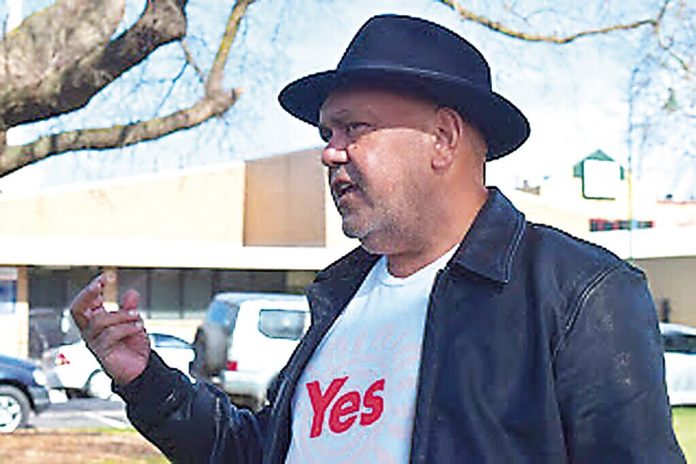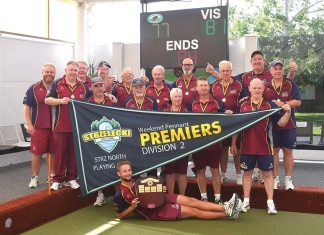STAFF WRITERS
THE October 14 referendum on the Aboriginal Voice to Parliament is an opportunity for Australians to finally fix one missing piece of the Constitution – and that is the recognition of Aboriginal and Torres Strait Island people – and give them a say in determining their future, according to the Yes 2023 campaigner and leading Aboriginal thinker, Noel Pearson.
Mr Pearson set out his views in a recent visit to Traralgon, Morwell and Warragul, and has spoken at venues around the country. “The Voice is so that Aboriginal people can have the opportunity to speak up in Parliament and voice their opinions, but they (politicians) don’t have to take it on, just have to consider and listen to the Voice,” he said.
Mr Pearson said the Voice is not a political issue but is for all Australians. “This is not a political issue, this is for country people and city people, this is for Liberals and for Labor, for Greens and for One Nation voters,” he said.
“It (the Voice) is a third way, which is that we be recognised as having our own identity, culture, languages, heritage within a united Australia.”
The Indigenous leader and lawyer says the referendum offers “symbolic” recognition of first peoples but goes a step further. “We’re going with a symbolic phrase at the beginning about the recognition of First Peoples of Australia, and then we have the substance. And the substance is an advisory committee that would provide representations to the Parliament and the Executive Government on matters relating to Aboriginal and Torres Strait Islander people,” he said.
“That’s an important phrase on matters relating to Aboriginal and Torres Strait Islander people…It is on matters relating to our people – health, education, jobs, all of the things we need to fix up in relation to Indigenous affairs.”
While heralding the achievements of many First Nations Australians, Mr Pearson says a Voice to Parliament presents a new opportunity for disadvantaged people living in a “parlous” position.”Our people are good people, but we occupy the lowest position in the country, but we can do it. People like me, people like so many other Aboriginal Australians who have done well in this country, show that it can be done. Now we want it done for the people of the Western Desert, of the Kimberley, of the Pilbara,” he said.
“Too many of our people in the communities are living short lives, living lives mired in welfare dependency, burying their relatives every other week and with low school attendance, poor health. These are the things that we need to get serious on if we’re going to address the too-often sad situation of our people.”
Mr Pearson said a Voice to Parliament “does not take away the rights of any other Australian”, and he remains confident non-Indigenous people will recognise this. “Jobs, health, education and all of the good things that Indigenous people need. That’s what the Voice will speak to.”
Mr Pearson said the Voice is simply an advisory committee that will help government develop policy for Indigenous people. “When you boil it down to its core, it is an advisory committee. It can’t direct the Parliament. It is there so that we can produce better results in the future for our people,” he says.
Mr Pearson said Australia must reach a point in its relationship with Indigenous people “where it is legitimate to blame us”. The Voice is “claiming the right to take responsibility”.
“By all means, blame us. But give us a say in the decisions that are made about us before you do,” Pearson said. “This is the message of the Voice. By having a Voice, we will be responsible for closing the gap. We will be as responsible as the government for the results. With power will come responsibility.”
Self-determination is hard work. “This is a critical insight for those concerned with Aboriginal policy at the highest levels and at the grassroots in claiming the right to self-determination. We are claiming the right to take responsibility,” he said.
To the argument put by the No campaign – that a Voice enshrined in the Constitution will “racialise” the nation – Mr Pearson said the power to legislate on the basis of race already exists in the Constitution, “so it makes sense to establish a body to advise on the exercise of that power”.
“Recognition through the Voice will provide a new power for Parliament to legislate the Voice that is not based on race but rather on recognition of our unique position and history as First Peoples of the country,” he said. “Aboriginal and Torres Strait Islanders are Indigenous peoples, we’re not a separate race. Our race is human. The same as all other Australians.”
In holding the referendum, Mr Pearson said the Prime Minister, Anthony Albanese, has simply done what Indigenous people have asked to happen over the past 10 years. “This is not the government’s idea, this has come from Indigenous people. We have sought this recognition. Now is our time to grow,” he said.
“We will show the world that it is never too late to reconcile, if it is done on the basis of justice.”
In Gippsland, the Gunaikurnai Land and Waters Corporation board unanimously advocates a ‘Yes’ vote. Their position statement says: “GLaWAC supports the federal government’s commitment to recognise the First Peoples of Australia through a change to the Constitution, while respecting the individual views held by our member and their right to vote how they choose.”
The Voice, however, is only one pillar in the step to support broad institutional reform at the Commonwealth level. “The organisation continues to work tirelessly toward a self-determining future for Gunaikurnai people, and we welcome any opportunity to strengthen our mob’s cultural, spiritual and physical needs.”
The board says it encourages all Australians to “consider the impacts that a No vote will have on First Nation as people and the nation”. “Our mob wants a greater say in the issues that are important to us regarding culture, country and the social and economic wellbeing of Gunaikurnai people,” GLaWAC said.
Olympic Gold medal winner Cathy Freeman backs the Voice. “Right now, each of us can be part of something that really matters. To stand together and show our support for Australians who need it most, to recognise indigenous peoples in our Constitution for the very first time, to give our kids the very best start in life, an equal start in life,” she said. “To open our hearts and change our future.”
The federal government has proposed to alter the Constitution to recognise the First Peoples of Australia by establishing an Aboriginal and Torres Strait Islander Voice.
The proposed alteration inserts the following text into the Constitution:
Chapter IX – Recognition of Aboriginal and Torres Strait Islander Peoples. 129 Aboriginal and Torres Strait Islander Voice.
In recognition of Aboriginal and Torres Strait Islander peoples as the First Peoples of Australia:
1: There shall be a body, to be called the Aboriginal and Torres Strait Islander Voice;
2: The Aboriginal and Torres Strait Islander Voice may make representations to the Parliament and the Executive Government of the Commonwealth on matters relating to Aboriginal and Torres Strait Islander peoples;
3: The Parliament shall, subject to this Constitution, have power to make laws with respect to matters relating to the Aboriginal and Torres Strait Islander Voice, including its composition, functions, powers and procedures.
On Saturday, October 14, Australians will vote Yes or No on whether they approve the amendment to be made to the Constitution.
The referendum requires a majority of votes in a majority of states to succeed, in which Parliament will then design the Voice via legislation.












